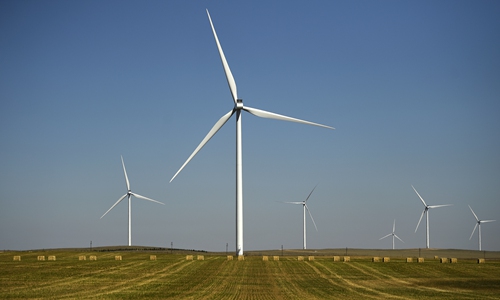
The collapse in global oil prices may end up being bad news in the short term for the transition to green energy, as cheaper crude could see more use of cars and aircraft.
But on the flip side, it could see companies move away from exploiting expensive fossil fuel deposits.
The plunging price of crude could prompt more people to use cars and planes rather than public transport, and encourage the purchase of bigger fuel-hungry models such as SUVs.
For individuals as well as businesses, a cheap barrel of crude also means cheaper heating oil, a slowdown in energy savings and could delay schemes to convert to "greener" electricity.
However, by reducing profits of oil majors cheap oil could see some potentially less profitable exploration projects put on hold, which would help cut future carbon emissions.
That is particularly the case with shale oil in north America, for example, which is costly to extract and is seen as not profitable below $50 a barrel.
But Charlie Kronick, oil finance adviser to environmental campaigners Greenpeace UK, said it could also delay companies in their move toward becoming more environmentally friendly.
"In purely financial terms, cheap oil will make it easier for fossil fuels to compete with the increasingly affordable renewables, making the economic case for companies like BP that are trying to reinvent themselves as greener energy producers more challenging, and potentially slowing the transition," he said.
"Expensive oil makes the alternatives, like electric vehicles, more attractive. Cheaper oil creates a headwind for that change," he told AFP.
Bobby Banerjee, from City University in London, stressed that given the climate crisis and promises from a number of countries to achieve net zero carbon emissions by 2050, investments in the sector were long term.
"Oil prices always fluctuate, no government makes decisions on oil prices," he said, adding that investment had already begun, helped by state subsidies which guarantee oil majors income.
Countries such as Britain are gradually closing all their coal-fired power stations.
The combined result has been that CO2 emissions in the energy sector dropped 2.0 percent worldwide in 2019, according to the independent energy think-tank, Ember.
Many businesses, notably investment funds, are also taking into account a high "carbon risk," which has led the world's biggest asset manager, Blackrock, to pull its investments in coal.
All these factors risk being supplanted in the short term by the coronavirus outbreak, which has paralysed the economies of several countries, grounded air traffic, and in the case of Italy, put the entire country into lockdown.
The demand for oil, especially from the world's second-biggest consumer China, is in free-fall.
This should lower CO2 emissions temporarily and even on a more sustainable basis if the effects of coronavirus are as severe as the 2008 global financial crisis.
Banerjee said the situation was "a perfect opportunity to remove the subsidies to oil companies because oil prices are low."
"It's a good time to put the carbon tax very high to accelerate the energy transition."
But given the likelihood of a looming economic slump, that could be politically problematic.
Kronick stressed that the transition to low carbon energy is not dependent on the price or availability of fossil fuels.
"The shift is ultimately driven by the need to avoid catastrophic climate change and the inevitable economic disruption that comes with the climate emergency," he added.
"The shocks that we're currently experiencing show that rapid changes are possible, though not always welcome. The economic conditions that we face now will pass, but the need to leave oil and gas in the ground won't.
"The additional challenge is to make sure that the corresponding crisis in the oil markets doesn't delay the low carbon transformation that we must begin now."




